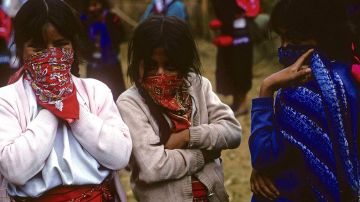Zapatista Army Dissolves Independent Townships in Chiapas, Mexico
The Zapatista Army has announced a change to the structure of their organization in Chiapas, Mexico

Photo: Julian Stallabrass from London, UK via Wiki Commons
For centuries, Indigenous peoples across Latin America have been the targets of oppression, discrimination, and violence. To address the systematic inequities they still face today, they’ve created groups and movements to demand liberation and autonomy. In Mexico, one such group is known as The Zapatista Army of National Liberation (EZLN). For decades, they’ve fought against the Mexican government and established independent, autonomous townships in Chiapas known as the Rebel Zapatista Autonomous Municipalities, which established their own healthcare, education, and agricultural systems without government aid. In a statement from this week, the group announced that they would be dissolving these townships but did not give a specific reason why though they cited group gang violence in the area of Chiapas that borders Guatemala, the Associated Press reported.
“In upcoming statements, we will describe the reasons and the processes involved in taking this decision,” the Zapatista Army said in the statement signed by Subcommander Moises. “We will also begin explaining what the new structure of Zapatista autonomy will look like, and how it was arrived at.”

The Army was originally founded in 1983 in Chiapas by both Indigenous and non-Indigenous members, and hoped to bring about substantial change for indigenous peoples like control over their own land and an end to economic and social inequities. While the group initially focused on peaceful protests and marches, they eventually led an armed uprising and declared war on the Mexican government in 1994 (though it’s now considered a frozen conflict). Since then, they’ve created 43 municipalities outside of government control and without aid, establishing public services like universal healthcare, schools, land restoration, popular assembly government, and feminist festivals.
In recent years, the townships have allegedly been victims of gang violence on the border of Chiapas and Guatemala, as well as drug cartel activity, migrant smuggling and trafficking, robberies, and kidnappings. They’ve also become isolated, closing community centers that allowed communication with the outside world, cutting ties with other groups and organizations, and causing youth to leave for more opportunities.
The Zapatistas issued a statement that was signed by more than 800 international organizations and more than 1,000 leading political and cultural figures calling out the rise of paramilitary attacks against them and the impunity with which they are met by both the state and federal government, El País reported in June of this year.
Thought the Mexican government has sent members of their military to combat crime in the area, there’s been little success. “The only reason they are here is to stem migration. That is the order they got from the U.S. government,” the statement added.
The Army’s statement hasn’t yet cited any specific reasons for dissolving this township structure, though some have proposed a connection with the upcoming 2024 presidential elections.

















